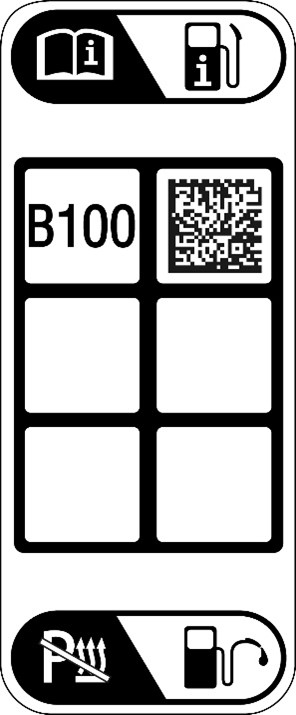
B100: Fuel recommendations
B100 biodiesel
B100 biodiesel is a type of biodiesel that consists of 100% FAME (Fatty Acid Methyl Esters). Because of the different properties of biodiesel compared to regular diesel fuel (EN 590) DAF has adjusted the Emission Aftertreatment System and engine software to ensure optimal performance and durability.
Vehicle identification
B100 biodiesel is only permitted for approved vehicles, indicated by a sticker on the fuel tank.
Usage
Not all B100 biodiesel types are suitable for cold conditions. Check with your fuel supplier for the minimum allowable ambient temperature.
If B100 biodiesel is unavailable, driving up to 2% of the yearly distance on regular diesel fuel (EN 590) is allowed in exceptional cases.
Additional maintenance
Using B100 biodiesel requires shorter service intervals and additional maintenance on:
-
EGR system
-
Emission Aftertreatment System (DOC & DPF)
-
Auxiliary heater
Storage
Storing B100 biodiesel requires some specific measures like:
-
Minimise direct exposure to sunlight whenever possible.
-
Avoid exposure to high ambient temperatures (above 30°C) whenever possible.
-
Avoid exposure to low ambient temperatures to avoid increased viscosity and pumpability issues (fuel gelling). Check with your fuel supplier.
-
Avoid storing B100 biodiesel for more than 3 months.
Fuel transfers
-
Minimise fuel transfers in the fuel supply chain to prevent adding water (approx. 50 mg/kg with each fuel dispense).

Vehicle storage
To avoid microbiological growth, slush formation, and material degradation, replace all fuel with regular diesel fuel (EN 590) if a B100 biodiesel vehicle is stored for more than a month.
-
Drain all fuel from the engine and fuel tank(s).
-
Replace all fuel filters.
-
Refill with regular diesel fuel (EN 590).
-
Operate the engine for a few minutes to blend any remaining B100 biodiesel with regular diesel.
Specifications
B100 biodiesel must meet the EN 14214 specifications. In addition, DAF recommends these additional specifications:
-
Group 1 metals (Na + K) content of max. 1 mg/kg
-
Group 2 metals (Ca + Mg) content of max. 1 mg/kg.
-
Phosphorous content of max. 1 mg/kg
-
Total contamination of max. 10 mg/kg
-
Monoglycerides (MG) content of max. 0.4 % (m/m)
-
Water content of max. 200 mg/kg